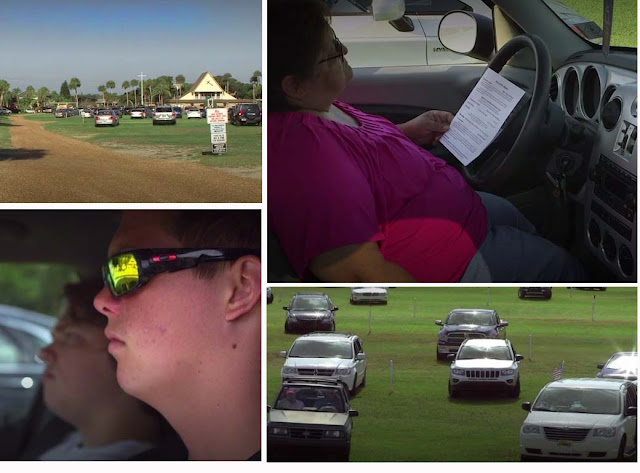by Nomad
As a child, I was never obligated to go to church on Sundays. It was, my parents said, something which they felt they should leave up to me. Although I can't recall any quotes, I sensed that in our home, organized religion was not highly thought of. It was, my mom and dad often implied, little better than a racket.
The only exception to the non-interference policy was when we visited my grandmother. We were strongly encouraged to attend the Methodist church, not for any alleged spiritual benefit but to appease my grandmother.
As a resident of a small town (pop. 94), she took an inordinate amount of pride in showing off her grandchildren. We were forced to dress "appropriately" in order to be scrutinized by a gauntlet of jealous grannies. On top of that, before the sermon, we were forced, as welcome guests, to stand and smile as best we could.
It was, at the time, to be a moment of barely survivable humiliation. As painful as all that was, today it seems like a century ago.
I have no doubt that, as all those powdered old ladies passed on, her church today sits as empty as an abandoned warehouse.
The Flock that Walked Away
In April, The Atlantic Monthly reported that in the last ten years. numerous polls have shown that Americans were fleeing organized religion in increasing numbers.Even though they still claimed to believe in God, the percentage that rejected any religious affiliation was growing fast, rising from 6 percent in 1992 to 22 percent in 2014. And for Millennials, the figure was even higher.
Two years earlier, commenting on another study, Alan Cooperman, director of religion research at the Pew Research Center, stated
“It’s remarkably widespread. The country is becoming less religious as a whole, and it’s happening across the board.”
As Cooperman points out, the trend covers all demographics.
While the drop in Christian affiliation is particularly pronounced among young adults, it is occurring among Americans of all ages. The same trends are seen among whites, blacks, and Latinos; among both college graduates and adults with only a high school education; and among women as well as men.
Search for Reasons
Sociologists have debated the possible causes for this mass exodus. Some have suggested that it was related to the rise of spirituality, or to an increased emphasis on multi-cultural individualism.Perhaps it is because the majority of organized religions seem unable or unwilling to keep up with progressive attitudes on subjects as diverse as women's rights, gay and lesbian rights, abortion and a host of other issues.
Others have suggested it might be a negative reaction to organized religion's entry to politics.
Whatever the case, this trend represents a long-term decline in the influence of religion in the lives of most Americans. A 2015 Gallup poll charted the percentage of people who felt "great deal" or "quite a lot" of confidence in organized religion or the Church. That study went from a high of 68% in the 1970s to around 40% today.
One impact of this decline? Politicians that have depended on organized religions are likely to see a steady drop in support. Churches themselves will, in turn, find a shrinkage in the ability to affect policy.
That, however, is a long term trend and the vestige of conservative religious attitudes are likely to remain for a long time, affecting elections in more subtle ways.
That, however, is a long term trend and the vestige of conservative religious attitudes are likely to remain for a long time, affecting elections in more subtle ways.
Drive-In Jesus
Brooklyn based director and producer, Lauren DeFilippo, enjoys making films about "visionaries, outliers and overlooked places."
In the short film, "Drive-In Jesus," DeFilippo captures an unlikely type of church in Florida.
In the short film, "Drive-In Jesus," DeFilippo captures an unlikely type of church in Florida.
Watch:
Of course, it is both unfair and impolite to giggle at other people's religious expression. When it comes to religion in general, we can find all kinds of bizarre and inexplicable absurdities. A drive-in Church only rates as "quirky" and "amusing."
Quaint but harmless.
Quaint but harmless.
It makes sense in some ways. Drive-ins have a certain wacky appeal. They were always a perfect combination of American institutions, the automobile film entertainment, and the open land. Moreover, the drive-in was a strange mix of socialization and isolation. With more isolation and less socialization, a drive-in might just be a perfect model for the church of the future.
The film does provoke a few questions: Who are these people and what brought them?
Even though we long for an opportunity to ask a few questions to both filmmaker and her subjects, DeFilippo keeps a respectful distance. She wants us to make our own observations and our own speculations. As with all effect documentaries, the images are vivid enough to speak for themselves.
In any event, it doesn't look like the flock of the devout will turn and walk away from the church on the hill. It's more likely they will just drive off and never return.
In any event, it doesn't look like the flock of the devout will turn and walk away from the church on the hill. It's more likely they will just drive off and never return.



